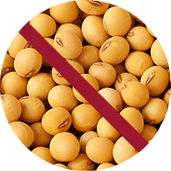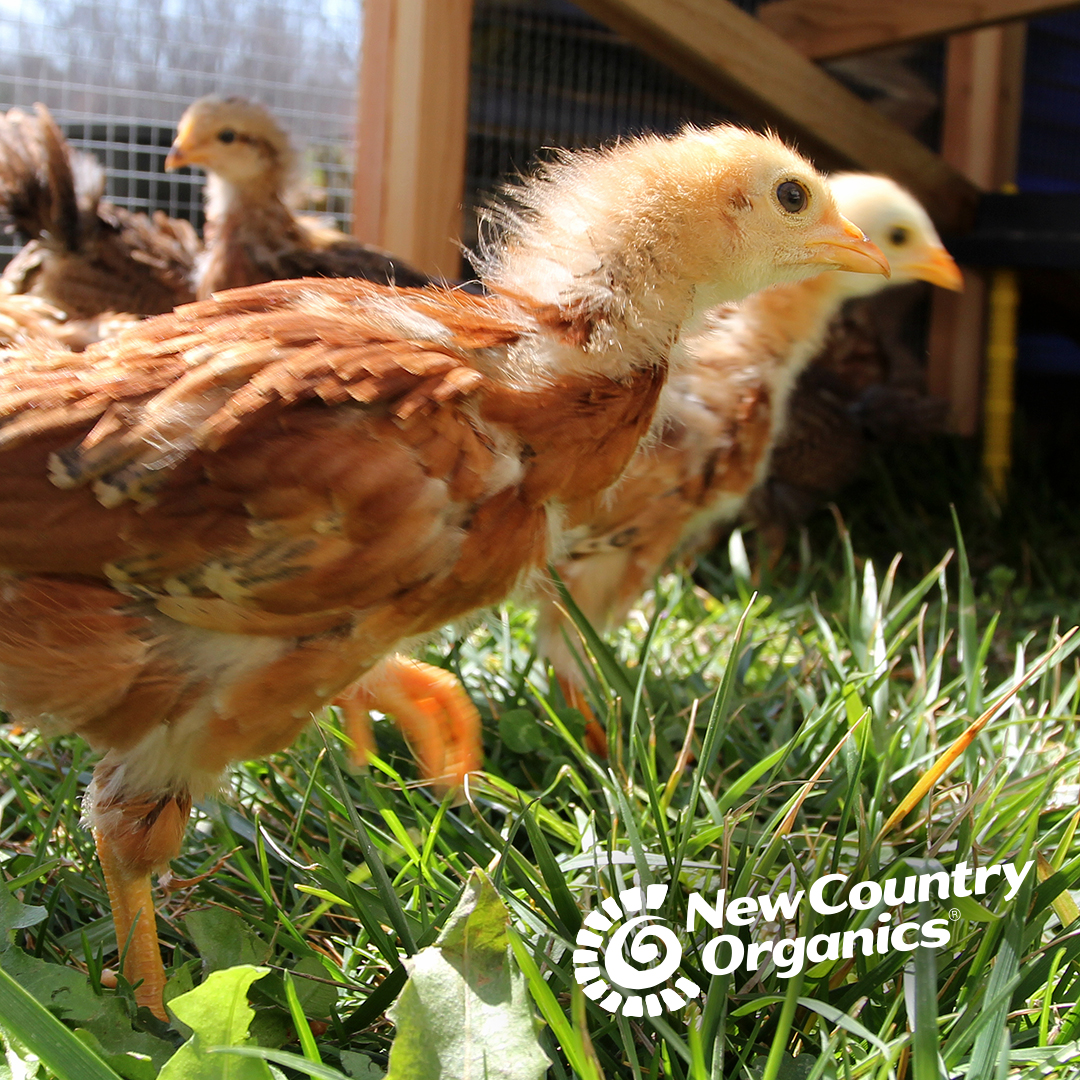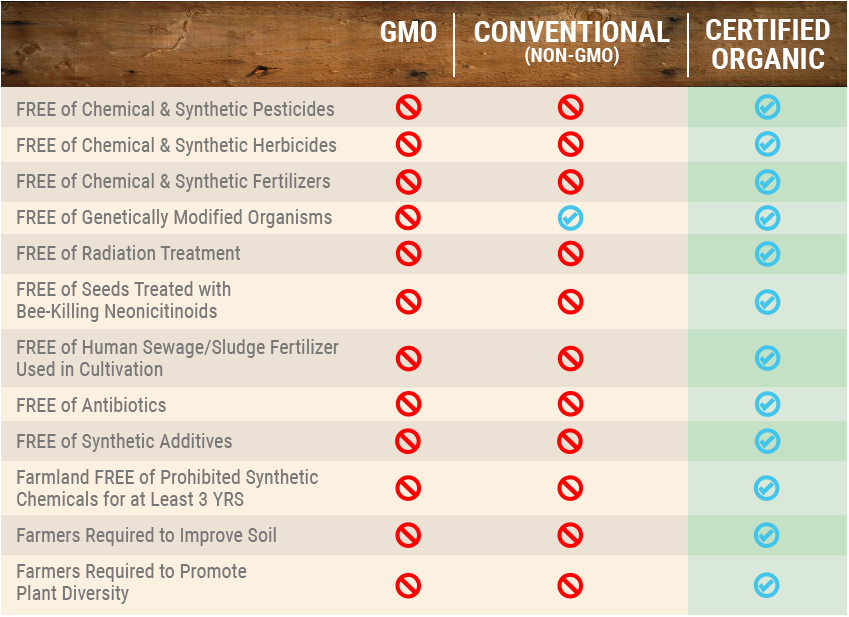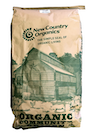

WHY FEED YOUR ANIMALS NEW COUNTRY ORGANICS?
We carefully design and mill our feeds and minerals with the health of your animals as our top priority. We never use least cost formulations. Period. That means we do not change our formulas due to cost fluctuations of specific ingredients, so your animals receive the same feed throughout the year.
Our feed is always fresh. We grind and mix in runs designed to keep just the right quantities on hand—stocked to maximize freshness while also ensuring there is always ample feed to meet ever-increasing needs. Now more than ever, we are helping you control your own food chain.
We believe Certified Organic grains are healthier, safer, and more nutritious for your animals. If your animals then go on to become part of the food chain, they perpetuate that health and safety to others. Our Certified Organic feeds and minerals are certified by SCS Global Services.


WHY SOY-FREE?
Soy is in seemingly everything. It’s an industrial feed ingredient. If it comes in a box and it is supposed to be edible, then chances are high that soy is on the ingredient list list. The likelihood is also high that the soy is transgenic (genetically modified). Americans eat more soy than traditionally soy-consuming cultures.
We don’t want soy to be in everything. Our multi-grain formulations provide a complete amino acid complement. New Country Organics is (passionately) soy-free for good reasons:
- Soy is high in phytic acid. Monogastric animals like chickens, pigs, horses, and humans don’t produce the enzyme phytase. Without phytase, phytic acid can block uptake of vitamins and minerals in the gastrointestinal tract. Not only is this a waste, but it is creating pollution concerns.
- Soy is high in phytoestrogens. This can have a multitude of health implications for all animals.
- Soy is a trypsin inhibitor. Trypsin is an enzyme that helps break down many different proteins. Inhibition of trypsin contributes to allergies.


YOUR ORGANIC FARM HERE
Organics, USA
We are working on building more organics. Right here in the US. Would you like to be recognized here? Get in touch. Tell us your story. Contact: 888-699-7088 | info@newcountryorganics.com
City Chicks: Keeping Micro-flocks of Chickens as Garden Helpers, Compost Makers, Bio-recyclers, and Local Food Producer, by Pat Foreman
City Chicks teaches the urbanite how to enable the local food supply by keeping family flocks of chickens as garden helpers, compost creators, bio-recyclers, and local food suppliers. And it addresses the problem many communities have not understanding how beneficial chickens can be in an urban setting. Learn how to lobby your local municipality to let you have chickens!The Small Scale Poultry Flock, by Harvey Ussery
The most comprehensive and definitive guide to date on raising all-natural poultry, for homesteaders or farmers seeking to close their loop, The Small-Scale Poultry Flock offers a practical and integrative model for working with chickens and other domestic fowl, based entirely on natural systems.Tomatoland, by Barry Estabrook
This is the story of the tomato: from its birthplace in Peru to the tomato growing capitol of the world: Immokalee Florida. Estabrook, the author, is an investigative reporter, and he reveals the human and environmental cost of the 5 billion dollar BIg Ag tomato industry. Once you’ve read this book you will never buy or eat tomatoes from the grocery store.The Third Plate: Field Notes on the Future of Food, by Dan Barber
Written by a chef who manages the famous Stone Barns restaurant in NY, this chef has taken farm-to-table dining to the max as he grows much of the food he cooks. This book delves into the small farmers who produce sustainable, organic food. He examines the role of soil, plant diversity, and sustainable farming practices by highlighting specific small farmers in the US and Spain.
The Market Gardener: A Successful Grower's Handbook for Small-scale Organic Farming, by Jean-Martin Fortier
Written by a farmer in Quebec, and using just 1.5 acres this farmer shows how you can feed up to 200 families. This book highlights how to grow food without a tractor, growing mixed vegetables systematically with attention to pest management and healthy soils.
Dirt: The Erosion of Civilizations, by David Montgomery
This is a powerful history of soil from ancient civilizations to modern times and how organic farming may help us avoid the fate of other civilizations. Nurturing the soil takes the approach of treating soil as a biological system rather than a chemical soup.
Holy Shit: Managing Manure to Save Mankind, by Gene Logsdon
This easy to read book provides the inside story of manure and what a great natural resource it is. The book describes how to manage farm manure, and how to compost.
Pandora's Lunchbox: How Processed Food Took Over the American Meal, by Melanie Warner
This is an eye-opening book about how foods are grown and processed thus creating the cheapest, most abundant, most addictive, and most nutritionally inferior food in the world. It is a shocker to read that most big food executives and food scientists admitted they do not eat the products they create and sell.
Carrots Love Tomatoes: Secrets of Companion Planting for Successful Gardening, by Louise Riotte
This is our go-to book for companion planting of vegetables and herbs. The first year we used it, our yields increased across the board and we had to do much less pest management.
Naturally Bug Free: Homemade Pest Control for Organic Gardening Made Easy, by Gaia Rodale
A great source for how to avoid chemical fertilizers and insect sprays with natural, home-made remedies.
The Soul of Soil: A Soil-Building Guide for Master Gardeners and Farmers, by Joseph Smilie
This is a wonderful book for understanding what sustainable agriculture is, reading the health of a field by the weeds, and how to nurture the soil with compost. Put simply this is how to grow your soil, so that the soil grows the plants.
Roots Demystified: Change Your Gardening Habits to Help Roots Thrive, by Robert Kourik
This book is great for understanding how roots grow including lawns, shrubs, vegetables, fruit trees, and ornamental trees. From choosing cover crops to choosing fruit tree varieties this book has tons of information. Understanding how roots grow is one of the keys to successful gardening and farming.




